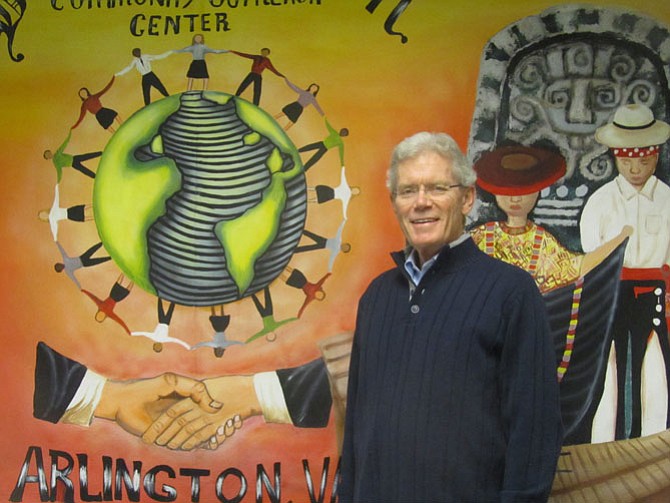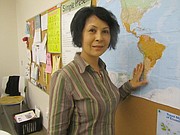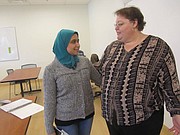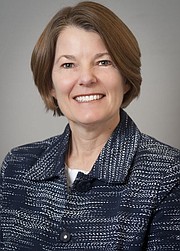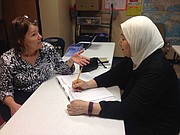Arlington County’s English language program for immigrants and refugees will mark its 40th anniversary on April 29 with an all-American celebration — complete with cotton candy, balloon animals and a cake walk. REEP, as the program is called, does more than teach English. Like the celebration, it’s a warm and welcoming introduction to American culture and customs. More than 100 trained volunteers from the community such as Ellen Clore-Patron, Mike Conway, Zuoergul Wulamu, and Elizabeth Hilla have a vital role as teachers, teachers’ aides, and literacy teachers. They supplement more than 30 professional ESOL (English for Speakers of Other Languages) instructors, coordinators, and specialists.
The acronym “REEP” relates to the program’s early name “Refugee Education and Employment Program.” Founded in 1976 and initially supported by federal refugee resettlement funds, the Arlington Public Schools program served a largely Indo-Chinese population. In the early ’80s, Arlington County provided funds to expand services to all refugees and immigrants living and working in Arlington. Since then, REEP has provided English classes to more than 150,000 limited English speakers from more than 90 countries, says director Suzanne Grant. Many students are from areas of conflict and for them, REEP can be a refuge in a new country and a place to make friends and become part of the community.
“Using a learner-centered, needs-based approach, we prepare adult English language learners to engage with the greater Arlington community, participate in activities designed for native speakers, and have a voice in community life,” Grant said.
Teachers say that it’s essential to acknowledge and respect students’ life experiences. Some students are well educated in their homelands and discover that they can find only menial work in the United States. Some have fled violence. Elizabeth Hilla, an association vice-president who teaches intermediate students at the Harvey Hall Outreach Center near Columbia Pike, admires the courage of the grandmother who moved here from Iraq after her husband was murdered. Another of her students, who received asylum in the U.S. after experiencing sectarian violence in his home country, immediately became involved campaigning for a presidential candidate. The curriculum emphasizes English for practical life skills such as opening a bank account, taking the Metro, shopping for groceries, arranging medical visits, and finding housing and a job. Teachers use games, music, everyday items such as grocery flyers, technology, and other creative methods that draw on the real-life experiences of adult students.
Volunteers teach the free drop-in classes at the county’s Bilingual Outreach Centers (Harvey Hall, Arlington Mill Community Center, and Gates of Ballston) while paid intensive classes are taught by the professional staff at the Syphax Education Center and Arlington Mill. Ellen Clore-Patron, a volunteer teacher for intermediate students at Arlington Mill Community Center on Columbia Pike, has an advanced degree in international administration and is taking classes in teaching ESOL. Growing up in a tiny and insular central Illinois river town, Clore-Patron became a language tutor in college and it changed her life. She received a fellowship to study how Japanese college students are taught English and later advised international students and American students studying abroad.
“My academic training in language has opened up my mind to cultural differences,” Clore-Patron said. She has found that students “learn the culture by learning the language. Our students want to learn language to thrive in the community they have chosen to live in.” She admires the perseverance of students such as the young Iraqi woman studying for an exam to earn professional certification and the Syrian woman whose husband and son remain trapped in the country by the civil war. “A lot of factors impact our students’ ability to learn,” she said. “As an English teacher, I can make a positive difference in someone’s life — and I don’t have to travel to do it.”
At the Gates of Ballston on north Glebe Road, Mike Conway is the lead volunteer teacher. Conway was a Fairfax County high school counselor, often working with immigrant students and their families. He currently volunteers with food programs in Washington, DC, and helps to coordinate a summer soccer camp at the school in Haiti supported by his church.
Conway’s roots are in Arlington: he has lived in six neighborhoods. He has watched Arlington become ethnically diverse over the years and feels fortunate to have “the world just beyond my front door” while still being able to visit the houses and streets where he once lived. He credits the county government and school system and an “informed and concerned citizenry” with making it possible to have services and programs like REEP for this diverse community.
Conway sees the REEP classroom as a place of exchange, where teachers learn as much as their students about new countries and cultures. “Given the politics of immigration,” he said, “I want to be a friendly American — greeting the students, shaking their hands at the door, engaging with them personally.”
“Immigrants are not always welcomed in the U.S.,” he said, “so I try to help students feel comfortable and accepted in the classroom.”
While most REEP volunteers are long-time Arlington residents, Zuoergul “Sokhra” Wulamu has been in the United States only three years. She came to the Syphax Center as soon as she arrived to enroll her daughter in school, learned about REEP, and began as a lower-level English student. She progressed rapidly and started volunteering as a classroom assistant about a year ago. A successful real estate agent and high school teacher in her home country, she also was a regular volunteer, visiting hospital patients and hosting small groups of orphans in her home. At the Syphax Center on Washington Boulevard, she assists teacher Angie Green with adults who are learning English and literacy skills at the same time. As a former teacher, she finds a “big difference in teaching styles” between the REEP teachers and teachers in her country. She says that classes here are informal and encourage discussion and questioning and teachers are action-oriented and expressive, which she feels is very helpful in learning. Most of all, she appreciates the opportunity to improve her own English skills while “giving back” to the community.
While volunteer REEP teachers have diverse backgrounds, they all appreciate the opportunity to give back to their community. “It’s a great chance to help immigrants, learn from them, meet interesting people and contribute to our community … and it’s a very well-run program,” Hilla said.
